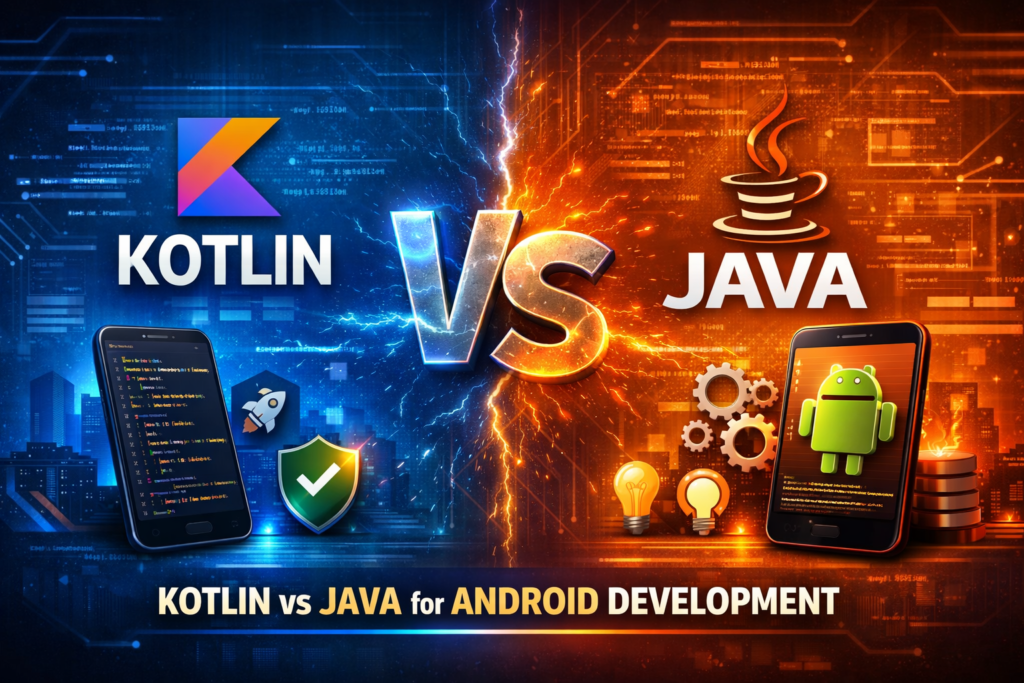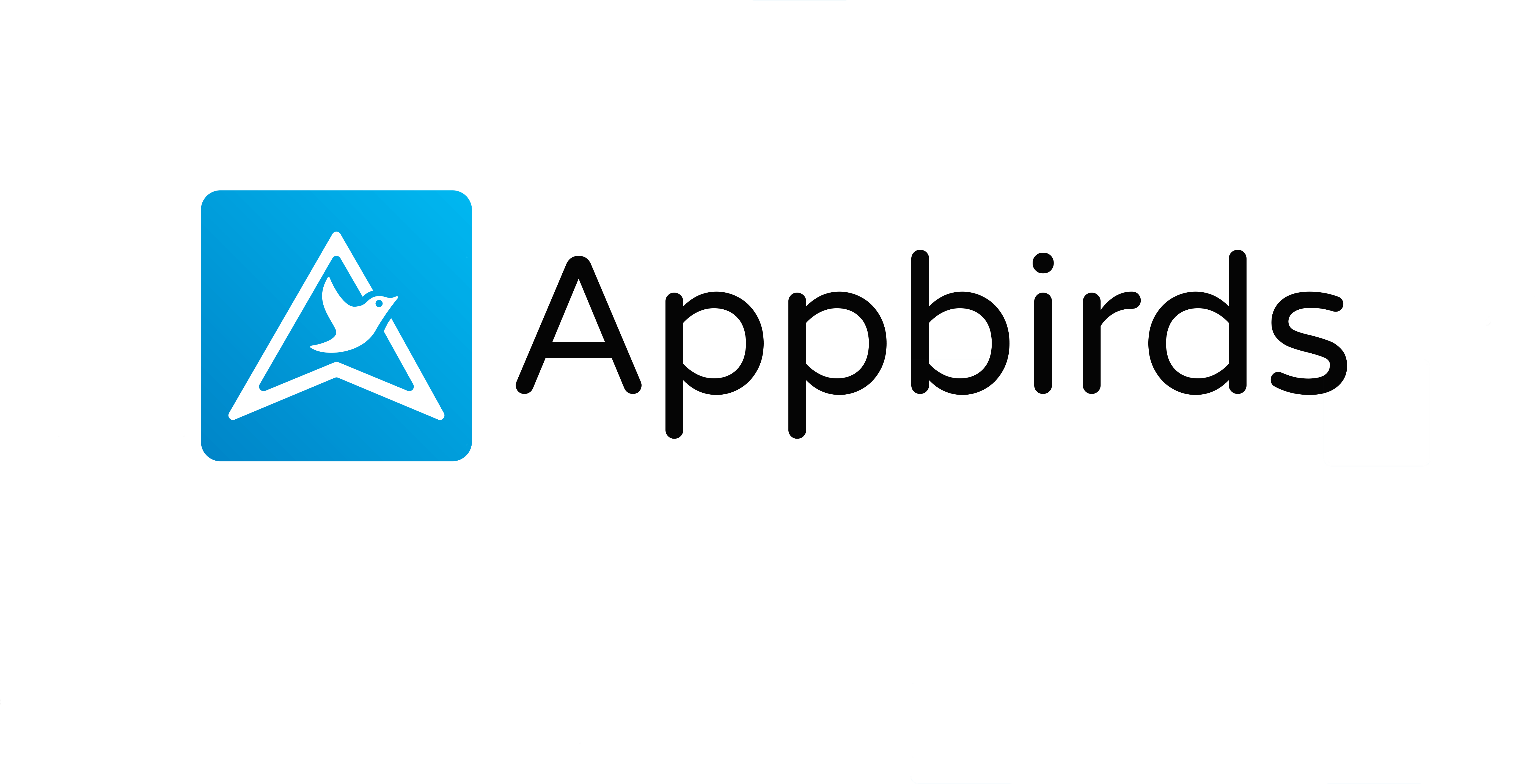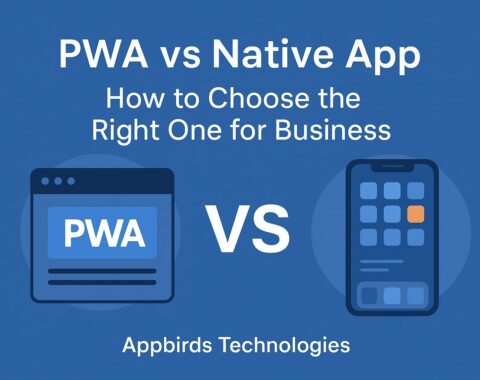For Android development, do you choose Kotlin or Java? The aim of this article is to explain the main differences between the two programming languages. Following that, we’ll discuss whether Kotlin is better over Java and highlight the key reasons why. Stay tuned with us until then.
Know: What is Java?
Java, which was created by James Gosling in 1995, is an open-source, general-purpose, object-oriented programming language. Java, as a multiplatform language, works on almost every device, operating system, and server. Furthermore, as it is compiled to bytecode, it can run on any Java Virtual Machine (JVM). Secondly, Java is statically typed, which means that type checking occurs during the execute stage. In fact, Java’s syntax is similar to that of C and C++, although it offers fewer low-level features.
Know: What is Kotlin?
Kotlin, which was developed in 2016, is a much younger language than Java. It is an open-source language that can compile code to bytecode and execute on the Java Virtual Machine (JVM), letting it to work on virtually any platform. Furthermore, libraries and frameworks written in Java can be used in a Kotlin project.
Kotlin, which is inspired by Java, aspires to express an upgraded version that is cleaner, simpler, and faster to compile, and includes both object-oriented and functional programming.
Why are we comparing Kotlin or Java?
As earlier mentioned, Java is a general-purpose language that, together with JavaScript and Python. It is one of the most used languages in the world. Kotlin is yet to compete for the top position, but it has proven to be a tough opponent in Android development.
In 2017, one year after its initial launch, Google declared Kotlin as its second official language for Android development. Kotlin was named Google’s preferred programming language for Android applications in 2019. As a result, this programming language experienced tremendous growth.

A better choice for Android development: Kotlin or Java – Know the differences
Now that we’ve stated some context, you might be wondering how the expansion of Kotlin affects Java. Will Kotlin take its place? The solution is more complicated. There are many differing viewpoints on this topic. To understand all sides of the discussion, we must first examine their differences.
Null Safety
The well-known NullPointerExceptions in Java give developers a pain. NullPointerExceptions are designed to allow users to assign a null value to any variable. However, suppose users try to use an object reference that has a null value. In that scenario, Java’s NullPointerExceptions kick in and raise an exception that developers must manage.
In Kotlin, however, it is not allowed to assign null values to variables or objects by default. If we try this, the code will fail to compile. As a result, in Kotlin, there are no NullPointerExceptions. However, if the developer wants to assign a null value, the variable in question can be explicitly marked as nullable.
To do so, insert a question mark: val number: Int? = null
Extension Functions
In comparison to Java, Kotlin allows developers to enhance the functionality of classes without having to inherit from them. To perform the extension function in Kotlin, the developer must use the ‘.’ notation to prefix the name of the class (that will be extended) to the name of the function created.
Now, To extend the functionality of an existing class in Java, one must build a new class and inherit the parent class’s functions. To put it another way, the extension function is not available.
Code
One of the primary differences between Kotlin and Java is that Kotlin requires far less code. It is a simple and compact language, which reduces the probability of coding errors and simplifies the work of developers.
Overall, Kotlin’s brevity makes it easier to develop huge projects because it requires fewer lines of code than Java to write the same methods. Furthermore, it understands how to make it short and to the point without compromising the readability of the syntax.
Coroutines Support
Components of the same application running on the same process and thread in Android by default are referred to as the main thread and responsible for the UI. Long operations include network I/O and CPU-intensive operations. When either of these operations is started, the calling thread is blocked until the entire operation is finished.
When performing lengthy operations, Java allows the establishment of several background threads to avoid problems on the main thread. The disadvantage is that handling numerous threads is a difficult operation that may result in additional faults in the code.
Similarly, Kotlin supports the creation of numerous threads. Nonetheless, it offers a simpler and more effective solution: coroutines.
How do coroutines perform? Coroutines, on the other hand, are stackless and allow the developer to write code, pause execution, and then restart it. This allows for non-blocking asynchronous code that appears to be synchronous. As a result, coroutines avoid having too many threads, rather than establishing numerous threads that the developer must handle later. Furthermore, they are clearer and simpler than Java’s solution.
Data Classes
On the one hand, when creating code in Java, programmers must create the fields (or variables) that will be used to hold the data, the constructor, the getter and setter functions for the fields/variables, as well as other functions, like the
hashCode(), equals(), and toString().
The truth is that these classes have zero (or, at most, very little) functionality and are mainly created to store data.
Kotlin, on the other hand, offers a simpler method for creating classes that can hold data by only putting the “data” keyword in the class definition. Following that, the compiler will automatically create the constructor and getter, and setter functions for a number of fields and variables.
Also read: Is Your Mobile App Compatible With The 5G Revolution?
Smart Casts
Java developers must verify that the variables’ types match the operation in order to create an object.
The smart casts feature in Kotlin handles casting checks. The “is-checks” keyword allows Kotlin’s smart compiler to automatically manage redundant casts (with stable values).
Checked Exceptions
On Kotlin, checked exceptions are not available. As a result Developers using Kotlin do not need to catch or declare exceptions. Is this convenient? It depends, actually.
Java programmers have explored the support for exceptions. They must therefore detect and describe exceptions. On the one hand, this might be time-consuming and frustrating. On either aspect, it makes sure that mistakes are handled and that the code is robust. So there are benefits and drawbacks to checked exceptions support. In the end, it comes down to what each developer values the most.
Public Fields
Java supports public fields, also referred to as non-private fields. They can be rather useful if the callers of an object need to change in order to conform to the representation of the same object because they allow the developer to change the representation of an object without having to modify the callers. The public API can remain unmodified and the application can keep a certain amount of maintainability if the fields are made public in this way.
Kotlin, however, lacks public fields.
Implicit conversions
Kotlin, on the other hand, does not support implicit widening conversions. As a result, the system cannot change smaller types into larger types. Developers using Kotlin must perform an explicit conversion in order to get the desired type of conversion around this.
Java, on the other hand, allows for implicit conversions, thus programmers are not need to carry out explicit conversions.
Kotlin or Java: Which is better?
First and foremost, Kotlin and Java both compile to bytecode despite their differences. As a result, developers can easily call Java code from Kotlin or vice versa, enabling the usage of both languages in the same development project.
As we’ve discussed, Kotlin does provide a lot of benefits for Android development, but is it better to Java? It does, however,
have some advantages over its competitor:
- It requires less code
- deployment is compact and compiles more quickly
- supports coroutines
- It is compatible with Java’s frameworks and libraries
- No longer NullPointerException
Nevertheless, let’s not ignore Java’s own advantages:
- Robust coding
- support for practically any server, operating system, or device across multiple platforms
- Because it has been around longer, it has a larger community, more documentation, and a varied ecosystem with a large number of libraries, and tools.
It must be more difficult to choose between Kotlin and Java now that we have shown the advantages of each language. Well, let’s attempt to look at it objectively.
In recent years, Kotlin has become the new Android language. Its success is a result of the language’s introduction of crucial features such as extension functions, lambda expressions, high-order functions, coroutines, and no NullPointerExceptions that are drastically improving the lives of developers.
These are only a few of the characteristics that allow us to confidently state that Kotlin is better to Java for Android development and will probably take over in the future.
Is Java Being Replaced by Kotlin? The new development tools that are emerging are aware that everything seems to be moving toward Kotlin! Java still has a lot to offer, though, and shouldn’t be ignored.
Java still rules supreme for general-purpose programming. It’s still a great language, even for Android development, thus it makes sense why some programmers choose it.
Actually, it also depends on whatever programming language you are more familiar with and which languages the development team is using. These are all valid concerns. Additionally, Java has long been one of the most widely used languages, thus it is doubtful that it will be completely replaced anytime soon.
Conclusion
Kotlin currently seems to be the best choice for Android development. Plenty of businesses and developers are using it, and the language will likely continue to grow.
Java is still a superb general-purpose language, though. It has long been a popular among Android users, so its replacement won’t happen just away.
In conclusion, the argument over whether language is better is complex and is likely to result in exciting discussions. Additionally, there are other factors to think about in addition to the differences between the languages, such as the language that the companies are using and how at ease developers are with Kotlin or Java.
Mobile app development is part of the future and has a lot to do in the forthcoming. So, turn your ideas into reality with the team of Appbirds well-versed professionals without giving it any second thought. Share your ideas with us and turn them into reality today! Got any questions or concerns regarding our mobile application development services? Feel free to contact us.



